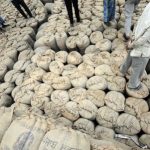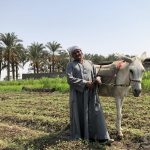BY JOSEPH GLAUBER AND DAVID LABORDE The unfolding crisis in Ukraine has roiled commodity markets and threatens global food security. Ongoing fallout from the COVID-19 pandemic and other factors have already driven up food prices. Poor harvests in South America, strong global demand, and supply chain issues have reduced grain and oilseed inventories and driven prices […]
CLOSING WORKSHOP: Building a Post-COVID-19 Recovery and Ag-Foresight Team in Egypt
This Closing Workshop presented the output produced under the project. Modelling, analysis, and training activities’ results were discussed and presentations provided a walk-through of the SPatial Agricultural Database for Egypt (SPADE)
الروابط بين السياسات التجارية والمالية المرتبطة بالغذاء ومعدلات السمنة
كيبروم اباى وحسام إبراهيم وكليمنس بريسنجر وعلى عبد الهادي تكاد معدلات السمنة وفرط الوزن ان تتضاعف ثلاث مرات منذ عام ١٩٧٥ ومن المتوقع ان تستمر في الارتفاع على مدار العقود القادمة (شيكار وبوبكن، ٢٠٢٠). يبدوا هذا الاتجاه أكثر حدة في الدول ذات الدخل المنخفض والمتوسط بالمقارنة بمثيلاتها ذات الدخل المرتفع حيث تنخفض هذه المعدلات تدريجياً (ان جى واخرون،٢٠١٤). يعتبر معدل […]
Decade of the Women’s Empowerment in Agriculture Index (WEAI): Lessons from Using Empowerment Metrics
The Women’s Empowerment in Agriculture Index (WEAI) is the first-ever direct measure of women’s empowerment and inclusion in the agriculture sector, and has been named one of CGIAR’s top innovations. Since its launch in 2012, WEAI-based metrics have been used by over 230 organizations across 58 countries to track progress toward women’s empowerment and gender equality
NEW PUBLICATION: Investing in Dates, Poultry, Olive, and Medicinal and Aromatic Plants Value Chains in Egypt
This policy note summarizes an evaluation of public investment options for Egypt’s agri-food system conducted by the International Food Policy Research Institute in collaboration with the Ministry of Agriculture and Land Reclamation of the Government of Egypt and Cairo University
- « Previous Page
- 1
- …
- 21
- 22
- 23
- 24
- 25
- …
- 27
- Next Page »





